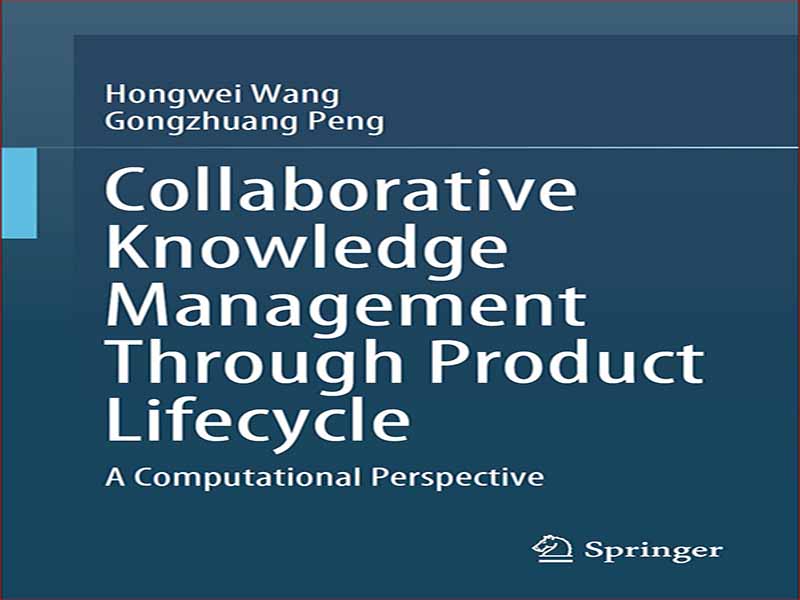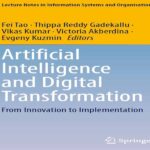- عنوان: Collaborative Knowledge Management Through Product Lifecycle
- نویسنده: Hongwei Wang
- حوزه: مدیریت دانش
- سال انتشار: 2023
- تعداد صفحه: 295
- زبان اصلی: انگلیسی
- نوع فایل: pdf
- حجم فایل: 7.64 مگابایت
در طول سه دهه گذشته، صنعت تولید بسیار سریع توسعه یافته است. از یک سو، پیچیدگی محصولات مدرن از نظر ساختار، عملکرد و الزامات تکنولوژیکی در حال افزایش است. این محصولات، از محصولات کوچک مانند تلفنهای هوشمند و مدارهای مجتمع گرفته تا محصولات بزرگی مانند خودروهای برقی و موتورهای هوایی با کارایی بالا، تغییرات شگرفی را در زندگی مردم ایجاد کردهاند. از سوی دیگر، رقابت شدید در سراسر زنجیره تامین جهانی، الزامات تقاضایی را برای شرکتهای تولیدی افزایش داده است تا نه تنها هزینه و زمان تولید را کاهش دهند، بلکه تواناییهای خود را در واکنش به چالشها در طول چرخه عمر محصول بهبود بخشند.
کاربرد متنوع فناوری اطلاعات (IT)، بدون شک، یک عنصر اصلی در نوآوری صنعت تولید است. از دهه 1980، تلاشهای زیادی از صنعت و دانشگاه برای توسعه سیستمهای فناوری اطلاعات مؤثر و کارآمد زیر چتر تولید یکپارچه رایانهای برای بهبود مدیریت دادهها، فناوریها و فرآیندها صورت گرفته است. اخیراً، با توسعه هوش مصنوعی (AI)، علاقه زیادی به تولید هوشمند شده است و شبکه تولید هوشمند جهانی یک الگوی جدید بوده است. پرداختن به مسائل مربوط به ماهیت یکپارچه و مشارکتی توسعه محصول مدرن و همچنین نیازهای پایدار و هوشمندانه به روند جدیدی از نوآوری در تولید تبدیل شده است. به طور خاص، ماهیت یکپارچه بر ادغام منابع چند رشته ای در یک محیط توزیع شده تأکید دارد. دیدگاه مشارکتی به کار مشترک اعضای تیم با نقش های متعدد و همچنین انطباق مدل ها و قابلیت همکاری بین سیستم ها و پلت فرم ها مربوط می شود. چشم انداز پایداری شامل دستیابی به تعادل بین کارایی فرآیندهای تولید و محدودیت های اعمال شده بر این فرآیندها از نظر نگرانی پایدار است. آخرین اما نه کماهمیت، دیدگاه هوشمند بر توسعه روشهای هوشمند برای استفاده مؤثر از اطلاعات و دانش در طراحی و فرآیند تولید محصول متمرکز است تا به نیازهای بازار پاسخ سریع و انعطافپذیر دست یابد.
در این زمینه، ما نیاز به بازنگری در توسعه روشهای موثر فناوری اطلاعات و هوشمند برای رویارویی با چالشهای جدید ذکر شده در بالا داریم. به ویژه، نیاز زیادی به حمایت مؤثر برای مدیریت دانش طراحی محصول و توسعه در طول چرخه حیات وجود دارد. روش های قبلی برای این پشتیبانی دارای اشکالاتی هستند: (1) تمرکز بر داده ها بدون توجه کافی به مدل. (2) ارزش گذاری اطلاعات اما از دست دادن زمینه. (3) ارزش گذاری فرآیند اما نادیده گرفتن کاربران. و (4) تمرکز بر پرس و جو اما نادیده گرفتن تعامل. هدف این کتاب دقیقاً ارائه برخی بینش ها در مورد این اشکالات است. این کتاب متفاوت از کتاب های قبلی در مورد مدیریت دانش سازمانی (KM) که بیشتر بر روی عملیات و مدیریت نوآوری متمرکز است، تمرکز ویژه ای بر ماهیت مشارکتی KM از دیدگاه محاسباتی خاص دارد، به عنوان مثال، به رابط بین فناوری اطلاعات و ارتباطات می پردازد. KM. دلیل اصلی این دیدگاه منحصر به فرد این است که با توسعه فناوری های پیشرفته مانند داده های بزرگ، اینترنت صنعتی اشیا (IoT) و محاسبات ابری، حجم عظیمی از داده تولید شده است. از این نظر، پشتیبانی مؤثر KM در طول فرآیند طراحی و تولید محصول باید به شدت بر این داده ها تکیه کند، و بنابراین نیاز فوری به تحقیق در مورد قدرت محاسباتی و الگوریتم های مفید برای این منظور وجود دارد. علاوه بر این، کشف دانش از دادههای محصول و فرآیند پیچیده، که در آن این دادهها تولید میشوند، برای سیستمهای KM نسل بعدی نیز از اهمیت بالایی برخوردار است. به این ترتیب، این کتاب دقیقاً مطالعات موردی از فرآیند طراحی و تولید محصولات پیچیده را پوشش میدهد و بر مسائل محاسباتی مانند مدلسازی دانش، ذخیرهسازی و بازیابی دانش، و استدلال و استفاده مجدد از دانش تمرکز میکند.
Over the past three decades, the manufacturing industry has developed very fast. On the one hand, the complexity of modern products has been increasing in terms of their structure, function, and technological requirements. These products, from the small ones such as smart phones and integrated circuits to the big ones like electric cars and high-performance aero-engines, have brought dramatic change to people’s life. On the other hand, the severe competition across the global supply chain has raised demanding requirements for manufacturing enterprises not only to reduce cost and lead time but also to improve their capabilities of reacting to challenges through the whole product lifecycle.
The diversified application of information technology (IT), without doubt, is a major element in the innovation of the manufacturing industry. Since 1980s, there have been great efforts, from both industry and academia, on developing effective and efficient IT systems under the umbrella of computer-integrated manufacturing to improve the management of data, technologies, and processes. Recently, as the development of artificial intelligence (AI), there has been great interest in intelli-gent manufacturing and the global intelligent manufacturing network has been a new paradigm. The addressing of issues relative to the integrated and collaborative nature of modern product development as well as the sustainable and intelligent requirements has become a new trend of innovation in manufacturing. Specifically, the integrated nature emphasizes the integration of multidisciplinary resources in a distributed environment. The collaborative perspective concerns the collaborative work of team members of multiple roles as well as the adaptation of models and the interoperability between systems and platforms. The sustainability perspective involves achieving the balance between the efficiency of manufacturing processes and the constraints imposed on these processes in terms of sustainable concern. Last but not the least, the intelligent perspective focuses on the development of intelligent methods to effectively utilize information and knowledge in the product design and manufacturing process so as to achieve swift and resilient response market needs.
In this context, we need to reconsider the development of effective IT and intelli-gent methods to meet the new challenges mentioned above. In particular, there is a great need of effective support for the management of product design and develop-ment knowledge through the lifecycle. The previous methods for this support have some drawbacks: (1) focusing on data without enough attention to model; (2) valuing information but missing context; (3) valuing process but overlooking users; and (4) focusing on query but overlooking interaction. This book precisely aims to provide some insights into these drawbacks. Different from the previous ones on enterprise knowledge management (KM) which are more focused on operation and innova-tion management, this book has a specific focus on the collaborative nature of KM from a particular computational perspective, i.e., addressing the interface between IT and KM. The main reason for this unique perspective is that, as the development of state-of-the-art technologies such as big data, industrial Internet of things (IoT) and cloud computing, a huge amount of data has been generated. In this sense, the effective support of KM throughout the product design and manufacturing process should heavily rely upon this data, and thus there is an urgent need of research on the computing power and algorithms useful for this purpose. Additionally, discovery of knowledge from both the product data and the complex process, whereby this data is generated, is also of highly importance for the next-generation KM systems. As such, this book precisely covers case studies from the design and manufacturing process of complex products and focuses on the computational issues such as knowledge modeling, knowledge storage and retrieval, and knowledge reasoning and reuse.
این کتاب را میتوانید بصورت رایگان از لینک زیر دانلود نمایید.
Download: Collaborative Knowledge Management Through Product Lifecycle




































نظرات کاربران